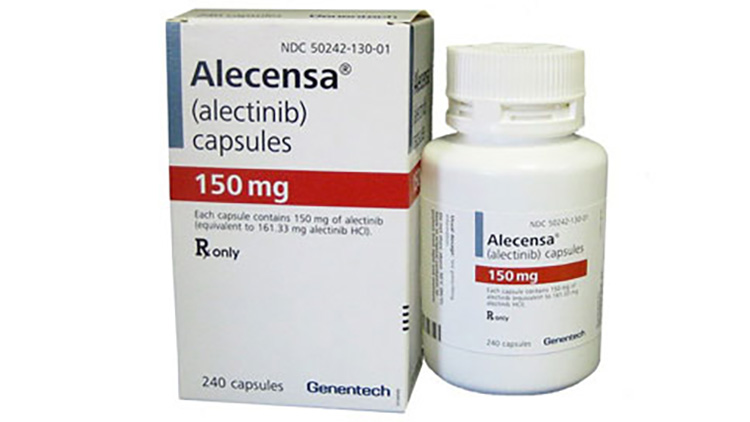Keytruda (pembrolizumab) vs Alecensa (alectinib)
Keytruda (pembrolizumab) vs Alecensa (alectinib)
Keytruda (pembrolizumab) is an immune checkpoint inhibitor that works by blocking the PD-1 pathway, thereby enhancing the body's immune response against cancer cells, and is commonly used to treat various types of cancers, including melanoma, lung cancer, and head and neck cancers. Alecensa (alectinib) is a tyrosine kinase inhibitor specifically designed to target the ALK protein, which can be involved in the development of non-small cell lung cancer (NSCLC), particularly in cases where the cancer is ALK-positive. The choice between Keytruda and Alecensa would largely depend on the specific type of cancer a patient has and its molecular profile; for instance, Alecensa would be chosen for ALK-positive NSCLC, while Keytruda could be considered for a broader range of cancers, particularly where PD-L1 expression is a factor.
Difference between Keytruda and Alecensa
| Metric | Keytruda (pembrolizumab) | Alecensa (alectinib) |
|---|---|---|
| Generic name | Pembrolizumab | Alectinib |
| Indications | Various types of cancers including melanoma, lung cancer, head and neck cancer, Hodgkin lymphoma, and others | ALK-positive non-small cell lung cancer (NSCLC) |
| Mechanism of action | Programmed death receptor-1 (PD-1) blocking antibody | Anaplastic lymphoma kinase (ALK) inhibitor |
| Brand names | Keytruda | Alecensa |
| Administrative route | Injection (intravenous) | Oral |
| Side effects | Fatigue, musculoskeletal pain, decreased appetite, pruritus, diarrhea, nausea, rash, pyrexia, cough, dyspnea, constipation, pain in extremity, and headache | Fatigue, constipation, edema, myalgia, anemia, elevated liver enzymes, decreased appetite, weight gain, cough, rash, and renal impairment |
| Contraindications | Individuals with hypersensitivity to pembrolizumab or any of its excipients | Individuals with hypersensitivity to alectinib or any of its excipients |
| Drug class | Anti-PD-1 monoclonal antibody | Tyrosine kinase inhibitor |
| Manufacturer | Merck & Co. | Genentech (a member of the Roche Group) |
Efficacy
Keytruda (Pembrolizumab) Efficacy in Lung Cancer
Keytruda, known generically as pembrolizumab, is a highly effective treatment option for certain types of lung cancer, particularly non-small cell lung cancer (NSCLC). As an immune checkpoint inhibitor, it works by blocking the PD-1 pathway, which some cancer cells use to hide from the immune system. By inhibiting this pathway, Keytruda enables the immune system to recognize and fight cancer cells more effectively. Clinical trials have demonstrated significant improvements in overall survival and progression-free survival in patients with metastatic NSCLC whose tumors express PD-L1, compared to chemotherapy alone.
The efficacy of Keytruda is particularly notable in patients with a high PD-L1 expression, where it has been shown to be a first-line treatment. Studies have indicated that Keytruda, when used as a monotherapy, can lead to longer overall survival rates in these patients. Additionally, Keytruda has been approved for use in combination with other therapies, such as chemotherapy, which has been shown to further enhance its efficacy in treating lung cancer, including those without PD-L1 expression.
Alecensa (Alectinib) Efficacy in Lung Cancer
Alecensa, or alectinib, is a targeted therapy for NSCLC that is specifically designed to treat patients who have an abnormal ALK gene, which can be found in a subset of NSCLC tumors. Alectinib is an ALK inhibitor, which works by targeting and blocking the activity of the ALK protein, thereby inhibiting the growth and spread of cancer cells. Clinical trials have shown that Alecensa is highly effective in shrinking tumors in patients with ALK-positive NSCLC, including those who have not responded to prior treatments.
In head-to-head comparisons with other ALK inhibitors, Alecensa has demonstrated superior efficacy in terms of progression-free survival, and it has been associated with a lower risk of central nervous system progression, which is a common complication in ALK-positive NSCLC. This has led to its approval as a first-line treatment for patients with ALK-positive metastatic NSCLC. The drug's efficacy, along with a generally favorable safety profile, makes it a valuable treatment option for this specific patient population.
Regulatory Agency Approvals
Keytruda
-
European Medical Agency (EMA), European Union

-
Food and Drug Administration (FDA), USA

-
Health Canada

-
Therapeutic Goods Administration (TGA), Australia

-
Medsafe (NZ)

Alecensa
-
European Medical Agency (EMA), European Union

-
Food and Drug Administration (FDA), USA

-
Health Canada

-
Pharmaceuticals and Medical Devices Agency (PMDA), Japan

-
Therapeutic Goods Administration (TGA), Australia

-
Medsafe (NZ)

Access Keytruda or Alecensa today
If Keytruda or Alecensa are not approved or available in your country (e.g. due to supply issues), you can access them via Everyone.org.
How it works

Make an enquiry
Choose the medicine you want to buy, answer a couple of questions, and upload your prescription to speed things up. We’ll get back to you within 24 hours.


Make an enquiry
Choose the medicine you want to buy, answer a couple of questions, and upload your prescription to speed things up. We’ll get back to you within 24 hours.


Breeze through the paperwork
We'll guide you through the required documents for importing unapproved medicine, ensuring you have all the necessary information.


Get a personalized quote
We’ll prepare a quote for you, including medicine costs and any shipping, administrative, or import fees that may apply.


Receive your medicine
Accept the quote and we’ll handle the rest - sourcing and safely delivering your medicine.

Some text on this page has been automatically generated. Speak to your physician before you start a new treatment or medication.
Let's talk
If you have any questions, call us or send us a message through WhatsApp or email:
Contact us




